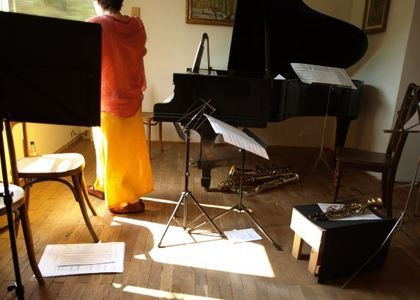> [Archived] Interviews

The Start to the Seventh Edition of the Țintea Muzicală Festival
The seventh edition of the Țintea Muzicală Classical and Contemporary Music International Festival opens on Thursday, 2nd July, 2015. This year, the festival has a core around which all the events revolve: the clarinet and the other instruments related to it. More details from Mrs. Adina Dumitrescu, artistic director of the Țintea Muzicală Festival.
The seventh edition of the Țintea Muzicală International Classical and Contemporary Music Festival is making its debut today. The core of this edition is a blowing instrument along with its family. What instrument are we talking about and how does this edition's schedule look like?
We're talking about the clarinet and its family, its limited family - the well-known E flat clarinet, the bass clarinet, the contrabass clarinet, the small clarinet, but also a clarinet from the folkloric Finnish music, since this year our guest is an important clarinet player from Finland, Mikko Raasakka. The instrument I was telling you about it called a liru and it very much resembles the clarinet in terms of shape, but less so in terms of sound; also, the saxophone, is present along many members of the family, like the alto, the sopranino and the soprano.
You've mentioned a guest. We know that this edition has a many more guests from Romania as well as foreign ones. Who are we talking about?
From Finland - clarinet player Mikko Raasakka and pianist Antti Vahtola; from Austria - clarinet player and saxophonist Eberhard Reiter; Simon Springer and Clemens Rofner - two young men responsible with Sunday's jazz concert. Then, from Romania, Emil Vișenescu and Ștefan Voinic - clarinet, together with Trio Mozaic, Oana Vișenescu - violin, viola and Diana Spânu-Dănilă - piano. We also have a soprano, Adriana Mihai, a percussionist - Lucian Simon, Otto Probst - piano and Carolina Astanei - mezzosoprano.
Tell us a little about the repertoire. I've seen that the guests are presenting both traditional and numerous contemporary clarinet works. Basically, you're familiarising the audience both with traditional musical literature and with the technical possibilities of the instrument.
This has been our wish from the beginning, to join famous classical music pieces with contemporary ones while the festival organisers invite composers every year to write a formula devised from the edition-specific instruments - the clarinet, this time. We have opuses by Mozart, Crusell (a Finnish contemporary of Mozart's) and contemporary works for clarinet, percussion and violin.
*
Composer Dana Probst, about the Țintea Muzicală International Festival
The seventh edition of the Țintea Muzicală International Classical and Contemporary Music Festival enjoys the presence of performers from Austria, Finland and Romania, such as, clarinet players Mikko Raasakka and Emil Vișenescu, clarinet and saxophone player Eberhard Reiter, soprano Adriana Mihai, mezzosoprano Carolina Iulia Astanei, pianists Otto Probst, Diana Spânu-Dănilă and Antti Vahtola, violonist Oana Vișenescu, percussionist Lucian Simon, bassist Clemens Rofner and percussionist Simon Springer. Composer Dana Probst, artistic director of the festival, shared Alexandru Mija the following:
Esteemed Mrs. Dana Probst, the seventh edition of the Țintea Muzicală International Classical and Contemporary Music Festival is making its debut today with an instrument that is in the foreground - the clarinet and its family of instruments. Could you please provide us with more details about the idea of making the clarinet the core of this edition...
We, as composers, love this instrument a great deal. It is a generous instrument that has a short history compared to other instruments - it was invented 300 years ago - but even today it has a lot to offer to contemporary composers. The clarinet as the theme of the edition has surely also to do with certain events, that is, the collaborations we had with Austrian and Finnish musicians, that we wanted to continue in Romania as well, taking into account the fact that in Romania, too, there are musicians and composers just as skillful. We wanted to have a benchmark in history, and that was Mozart, of course. Mozart loved this instrument a lot. The instrument was still new, still frail, but Mozart put it to good use and gave it a place in history. It reaches several genres; other than classical and contemporary music, we approached jazz, even pop and musicals in our last concert, due to the saxophone.
The festival has an educational and pedagogical side to it, as well. To this end, today, the first day, two workshops took place. What are they about?
At the University of Music we start with two short workshops, the clarinet ones, and two composition ones. United, they would be two larger workshops - clarinet and composition - that will be held by Mikko Raasakka, a clarinet player from Finland, by Eberhard Reiter, a clarinet and saxophone player from Austria, Karmella Tsepkolenko from Ukraine, a composer known in Romania and Drew Wilson from Great Britain.
This year, too, the festival will take place in several cities and locations.
We started a long time ago from the birthplace of our father, Țintea, Băicoi, 20 km north of Ploiești, and we've slowly extended the show's area. This year, there are four concerts in four different places. We start with a concert that takes place in the Enescu Hall at the University of Music on Friday, 3rd July, at 17:00. On Saturday, 4th July, at 19:00, there is the second show in the garden of our house in Țintea (hopefully, the weather will be nice). On Sunday, 5th July, at 12:00, at noon, there is the third concert in the Cristos Rege Romano-Catholic church. And Sunday, 5th July, at 19:30, there is the final concert of the festival, at the Culture House in Liliești-Băicoi, in close proximity of Țintea.
Translated by Bucur Adrian and Elena Daniela Radu
MTTLC, the University of Bucharest














